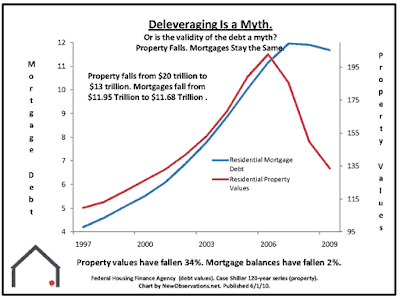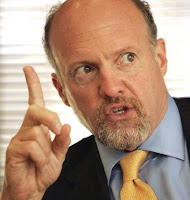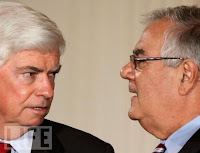 The Maestro and the Hundred Year Flood
The Maestro and the Hundred Year Flood
By Keith Hazelton, The Anecdotal Economist
Alan Greenspan’s self-serving “The Crisis,” a 66-page white paper outlining exactly why no part of the extant global financial/liquidity/credit/solvency/deleveraging crisis was the fault of the Federal Reserve whose board he chaired for 18 year or anyone or any other entity for that matter, contains among the many exculpatory assertions, a fascinating, if not stupefying, revelation that, in setting capital adequacy levels, reserves and leverage limits, policymakers:
“…have chosen capital standards that by any stretch of the imagination cannot protect against all potential adverse loss outcomes. There is implicit in this exercise the admission that, in certain episodes, problems at commercial banks and other financial institutions, when their risk-management systems prove inadequate, will be handled by central banks. At the same time, society on the whole should require that we set this bar very high. Hundred year floods come only once every hundred years. Financial institutions should expect to look to the central bank only in extremely rare situations.” (p16-17, all emphasis added.).
No sir, Sir Alan. Hundred year floods come
on average only once every hundred years, as any undergraduate who has completed Statistics 101 would recognize, presumably based on many centuries of flood observations in a particular locale.
Now we know if one flips a coin 100 million times, a tabulation of heads/tails results likely will yield a result infinitesimally close to 50/50, so that one may conclude,
on average, the actual observation results would prove the statistical probability for each flip that the coin lands heads-up is 50 percent (we conveniently are excluding any possibility of the coin landing, say, balanced vertically on edge.)
We also can be confident in such a large observation, however, that low-probability strings of 10, 20 or 30 consecutive heads-up or tails-up results – while extremely unlikely in 100 flips – would, in fact, be commonplace.
That such occurrences have low probabilities, even extremely low probabilities in smaller observation samples, is immaterial. Regardless of the number of observations, even low probability events are bound to occur, and they are neither randomly nor evenly distributed.
Similarly, nature has no constraints as to the frequency of hundred-year floods, only that
on average they should occur once every century, but if it pleases nature to generate 10 hundred-year floods in a century, and none for the next 900 years, albeit a low-probability event, such an observation is completely within the framework of reality.
Neither are there constraints, apparently, on the frequency of meltdowns in the complex, deregulated financial environment we have invented and unleashed upon ourselves, even though, unlike nature,
we completely are in control of the frequency and regularity of hundred-year financial disasters.Which is what is so self-serving about the former Fed chief’s term paper. By defaulting to a “stuff-happens-once-every-hundred-years-so-there’s-no-point-in-trying-to-prevent-it-since-the-negative-effects-of-prevention-would-outweigh-the-flood-cleanup-cost” defense, Sir Alan absolves himself, his fellow FOMC decision-makers and Fed economists, successive Congresses and Administrations, the banking and financial system, China, Japan, Germany and, yes, the American “consumer” from any culpability in the generation-long, debt-fueled party which has induced this hundred-year hangover.
It’s also what’s wrong with economics in general. Since macro-economic theories and policies cannot be experimentally verified – we can’t go back in time to see how different decisions in the past would have altered the present and future – Mr. Greenspan expects to get a pass when he essentially observes that removing the Fed’s easy-money punchbowl earlier in decades past, or perhaps merely serving smaller portions of credit-debt-leverage punch along with deregulation cookies, somehow would have created a
worse outcome than the present mess, and he concludes his term paper with an untestable assertion:
"Could the breakdown that so devastated global financial markets have been prevented? Given inappropriately low financial intermediary capital (i.e. excessive leverage) and two decades of virtual unrelenting prosperity, low inflation, and low long-term interest rates, I very much doubt it. Those economic conditions are the necessary, and likely the sufficient, conditions for the emergence of an income-producing asset bubble. To be sure, central banks have the capacity to break the back of any prospective cash flow that supports bubbly asset prices, but almost surely at the cost of a severe contraction of economic output, with indeterminate consequences." (All emphasis added.)
Which is followed by a monstrous, ominous, “be-glad-we-only-have-a-mess-of-this-hundred-year-severity-to-clean-up” whopper:
"The downside of that tradeoff is open-ended."
Cue scary music. Of course the consequences are indeterminate, Sir Alan, and we never will know what our present and our children’s future would have been like had other, more prudent fiscal and monetary policies had been adopted by all participants, but in parsing Mr. G’s conclusion above, we find exactly where, and with whom, the fault resides:
- Excessive leverage of financial institutions? Congresses, Administrations, the Federal Reserve, FDIC, OCC and OTS, without question.
- Two decades of virtual unrelenting prosperity? Apparently is was virtual prosperity, not real prosperity, because it came at a price of excessive, unsustainable leverage among individuals, businesses and governments.
- Low Inflation? An obsession with consumption of low-cost goods imported from low-cost, overseas manufacturers, again fueled with leverage, instead of savings.
- Low long-term interest rates? Why Alan, you remember, it’s the Federal Reserve which sets interest rates, and you were its chairman for 18 years.
The fault then, it would seem, dear Alan, “lies not in our stars,
but in ourselves,” and certainly not in the hundred-year flood, to badly paraphrase William Shakespeare’s Caesar.
And it would be amusing – this whole “it’s nobody’s fault, stuff happens” bit about hundred year floods coming only once every hundred years – if not for the physical, emotional and national wealth-destroying carnage of “
The Crisis” of the last three years.
Not to mention the many years, if not decades, in our now
less prosperous future which will be required to rebuild ourselves from the ground up after such an easily avoidable catastrophe, unlike nature’s hundred-year floods, of our own design.
OK, so it’s only the second draft of his term paper – maybe he’ll revise the final publication to attribute
at least some culpability, but don’t count on it. Right now, I give it a "D+."
The Maestro and the Hundred-Year Flood






































